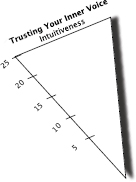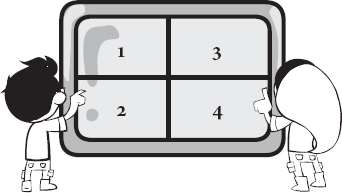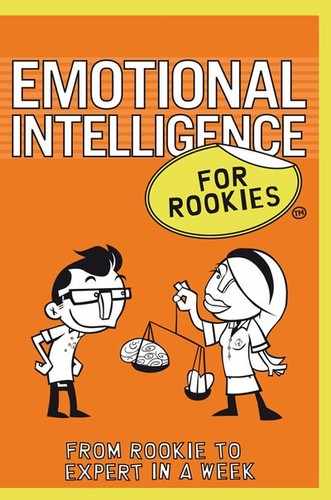CHAPTER 8
Trusting your inner voice
What is intuitiveness?
This chapter explores intuitiveness and why it’s important. It provides you with the opportunity to try it out by using some very practical exercises. Developing and using your intuitiveness will give you:
• A self-checking system you can trust.
• A way of supporting yourself.
And by the end of this chapter you will not only understand the importance of tapping into your intuitiveness, but you will also value it as one of the most useful life skills that you can ever possess.
Higgs and Dulewicz define intuitiveness as: “The capability to arrive at clear decisions and drive their implementation when presented with incomplete or ambiguous information using both rational and ‘emotional’ or intuitive perceptions of key issues and implications.”
Take a moment to reflect on this definition.
• What is it saying to you?
• Which are the key words or phrases that stand out?
• Why are they important to you?
It’s about trusting your inner voice!
Intuitiveness is your ability to tap into the power of your intuition or your sixth sense (referred to here as your inner voice), and to make full use of it to enable you to make quicker and wiser choices or decisions. It is about using the combination of a solid knowledge base with the ability to “sense” what needs to be done, and then taking the required action.
An emotionally intelligent person learns to listen to their inner voice and trust the value that it brings.
Why is intuitiveness important?
Your “sense” or “gut feeling” may well be a remnant of an early warning system for danger, an apprehension or “gift of fear”. The ability to think through your decisions and arrive at the “correct” answer is not enough: you also need to be able to acknowledge your gut feeling – that is, your instinctive, astute response.
Learning to work with your intuition isn’t only necessary: it’s vital to business and personal success. The ability to “sense” what is going on, and to collect and interpret the “soft” data (that is, feelings), is seen in the most emotionally intelligent business leaders. The most impressive of these leaders are those who have refined their intuitiveness – they can judge if relationships are working and pick up on non-verbal cues, and are able to use this information in formulating their response to challenging situations.
With the amount of information that floods the workplace today, making decisions based on all the rational facts could take a very long time indeed, so the ability to trust your judgement could give you a competitive edge in starting a new initiative or responding to a crisis. Around 80 per cent of senior managers use intuition when working in ambiguous situations, and often the more senior they are, the more they rely on their intuitiveness.
 Rookie Buster
Rookie Buster
Learning to work with your intuition isn’t only necessary: it’s vital to business and personal success.
The importance of developing intuitiveness is that it enables you to deal with many situations. For example, someone with a high level of intuitiveness can:
• “Tune in” to the true nature of a person or situation.
• Make decisions in difficult situations.
• Build support for these decisions.
• Recognize that often it is more important to make a decision than to have all possible information available.
• Balance intuitive thinking with rational thinking.
• Reach a timely decision.
For example, Richard Branson, CEO of the Virgin Group, uses intuition to make decisions. If it feels right, he just does it. His book Screw It, Let’s Do It, provides many of his personal, intuitive examples. It’s a book worth reading.
What can affect your intuitiveness?
Your logical, analytical mind can!
When you focus on problems and churn them around and around in your head, it can feel like you’re in a whirlpool. The swirling, bubbling water represents your analytical mind going over and over the problem. Often this leads to confusion and you may hear yourself saying, “I just can’t think myself out of this one.”
If this is the case, you need to engage your intuitive mind. This enables you to look beyond the turmoil, into the deeper, calmer water. Once you open your mind to explore these deeper parts of yourself and “listen” to what it might be telling you, you’ll be surprised at how many answers present themselves. Intuition supports and enhances logical decision making, enabling you to come up with quick solutions – and be able to trust in them.
 Rookie Buster
Rookie Buster
Intuition supports and enhances logical decision making, enabling you to come up with quick solutions.
You must stop the constant self-talk of your analytical brain and listen to your intuition. Trust that it is always there, letting you know what to do. Ask yourself, now, to what extent are you able to listen to your intuition, and how willing are you to act on it.
Another thing that can affect your intuitiveness is knowing that it exists, but choosing not to use it.
Ignore your intuitiveness at your peril! Not listening to or following your intuition may have caused you regret in the past. As you look back, you may recognize certain situations where you have done something or made a decision that has gone wrong. You can probably see that the “feelings” or “early warning” signals were there, but you didn’t listen because they seemed irrational to you.
Exercise – When did you ignore your intuitiveness?
Take a moment to think of a time when this has happened to you.
Make a note of the circumstances; how you felt at the time; what convinced you to go with the decision that you did; and what was the outcome of taking this decision in both the short and long term?
Now go on to reflect on what you learned from that experience, and how you have applied it since.
Tip: pay attention to your feelings. Never ignore your body’s signals: it could be telling you something really important. Those physiological tell-tale signs – the tingling feeling of happiness, the “pit of the stomach” feeling – whatever you experience, positive or negative, take notice!
The ability to trust your inner voice
As Gerd Gigerenzer, a cognitive scientist and author of Gut Feelings: The Intelligence of the Unconscious, says, “The question is not if, but when we can trust our guts.” When faced with making a decision where you don’t have all the necessary detail, Gigerenzer says that “it makes more sense to trust your intuition, with its evolutionary advantages, than your conscious brain”.
“The lesson is to trust your intuition when thinking about things that are difficult to predict, and when you have little information,” he says.
 Rookie Buster
Rookie Buster
“It makes more sense to trust your intuition, with its evolutionary advantages, than your conscious brain.”
Your intuition can also be relied upon in situations where you have experienced the same thing many times before. For example, if you are an experienced stockbroker you will make snap decisions as to where you should place an investment, or if you are an interviewer you “just know” when someone is right for the job. This is because you have experienced many similar occasions, and all the information is stored in the unconscious parts of your brain. You can then tap into this stored information later to make instant decisions without being aware of it.
Tip: Become an expert. You can enhance your intuitiveness by equipping yourself with more knowledge and experience – for example, if you want to make better financial decisions, find out as much information as you can on the subject. Your brain will store it all for later use.
Keeping things in balance
Intuition is not perfect. You can go with your “gut feeling” and find that it turns out not to be the right thing to do. As you have read earlier, it is unwise to use either logic or intuition to the exclusion of the other. By using both logic and intuition in balance you can make “safer”, wiser decisions.
Richard Broughton, president of the North Carolina-based Intuition Laboratories, advises that you use your intuition to home in on a narrow range of choices quickly, then turn to logic to help you decide between them. For example, in the “buying a house” scenario, go to your “gut feeling” first, asking yourself “Which of the houses did I warm to? Which of them had a good ‘vibe’?” Then, once you have some examples to choose between, you can turn to logic to help you pick the best one. Ask yourself questions like “Which one is closest to the right size, location, etc.?”
 Rookie Buster
Rookie Buster
By using both logic and intuition in balance you can make “safer”, wiser decisions.
Trusting your inner voice: Bringing intuitiveness to life
Your starting point

1. Transfer into this box your intuitiveness score from the EI self-perception questionnaire in Chapter 2.

2. Now that you know more about intuitiveness, re-evaluate this score and plot on the Trusting Your Inner Voice blade above. This score is an indicator of your level of intuitiveness, and is based on your self-perception.
3. Reflect on your entries in your emotions diary, and if you recognize there is scope for strengthening your intuitiveness, take some time here to jot down your ideas. You may like to think about this in terms of what you could start, stop and continue.
• Start – for example, start being more confident in basing decisions on my “gut feeling”.
• Stop – for example, stop suppressing any intuitive feelings, and instead listen to them.
• Continue – for example, continue being open minded about using intuition.
4. Use The Johari Window template in the Appendix and consider, in relation to intuitiveness, how you behave and how you feel. Jot down your behaviours (Box 1) and your feelings (Box 2).

5. Your intuitiveness has an impact on others. To gain a true understanding of this, you need to ask others for their feedback. Identify four people who know you well in the workplace, and use the five statements from the intuitiveness section of the EI questionnaire (page 38 in Chapter 2) as prompts for discussion with each of them. Their perceptions will provide valuable data – some may confirm your own perception, while some may differ.
6. Go back to The Johari Window template, and in Box 1 capture the perceptions shared by you and others. Then complete Box 3 and record anything you had been previously unaware of. The real value of this exercise is discovering things you don’t already know about yourself.
7. Based on your findings, revisit and, if necessary, revise your start, stop and continue actions.
You can now bring your intuitiveness to life through the following personal development activities.
Personal development activities
1. Assessing your intuitiveness
Here are three very simple, fun activities which will help you to see how intuitive you are.
Quick as a flash!
Intuitive people have the ability to name objects which they will have seen for only 1/25 of a second! How quick are you?
Ask a friend or colleague to show you a selection of different pictures and/or objects at speed, and you have to say what they are, as quickly as you can.
What’s in a cloud?
Intuitive people make creative associations. This enables them to be open to new ideas and not to accept the first solution which comes to mind.
The easiest way to develop and practise this is to look at the clouds in the sky. Try to look beyond their physical shape and look at the picture within. Perhaps you did this as a child: “Hey, mum, look! That cloud looks just like a duck.” Next time you are out, take a moment to glance up and look beyond the predictable.
Freeze frame!
Intuitive people have the ability to recall information that they weren’t aware of learning. To practise this skill, you need to make a two or three minute recording of a crowd scene from a television programme.
Before watching the recording, you need to enlist the help of someone else. Ask them to watch the scene with you, and when the recording has stopped, switch the screen off and ask the other person to ask you questions about the scene.
Once you have responded to their questions, you can replay the scene and assess how accurate your observations were.
2. Listening to your intuition
This is an activity that you can try which helps you to really listen to yourself.
Step 1
The next time that you experience a feeling which seems to be acting as a warning, stop and take some deep breaths. Acknowledge how you are feeling and try to identify what that feeling is – is it confusion, anxiety, apprehension, excitement?
Step 2
Then find yourself a quiet place to do this exercise. Create a calming atmosphere; you may want to put some soft music on. Close your eyes and ask yourself, “What is the best thing that I can do about it right now?” The important thing to do now is to listen. Be quiet. Try to block out any of the internal chatter that you may have going on inside your head. Wait for your answer. Don’t worry if nothing comes immediately: it will do when you are ready for it.
Step 3
Be sensitive to what you feel. Listen to the messages your body gives you. The answer may present itself in many ways, such as:
• You may feel it’s just the right thing to do.
• It may come to you when you are thinking about something else.
• It may come as a small voice in your mind.
• It may come to you when you are talking to someone.
• It may just come to you in a flash.
Trust in the fact that you will know the answer when it comes.
Step 4
Act upon your intuition. Do it with confidence!
3. Freeing your intuitive spirit
What follows are some helpful questions which ask you to think about the decision you need to make in a way that will help to open your mind.
For this to work, you must trust your first impressions and believe in your answers! Go with the flow: you will be delighted with the results.
As you go through the exercise, write down your responses to each of the questions.
Here goes! Ask yourself:
• If this situation had a smell, what would it be?
• If this decision was a piece of fruit, how would it taste? How much juice would it have in it? Would I like to eat it?
• If this idea was making a sound, what would it be? Would it be tuneful or not?
• Before making the final decision, ask yourself, “How do I really feel about this?”
Another useful technique is, before taking any action, to take each option in turn and ask yourself the following questions:
• “If I take this option, how will I feel?”
• “If I don’t take this option, how will I feel?”
Listen to the signals from your body, and choose the option that gives you the better feeling.

Coach’s notes 
Everyone possesses intuition, but only emotionally intelligent people tap into it and use it to improve both their decision-making and their relationships with others.
To continue developing and honing (or fine-tuning) your intuitive skills, you must:
• Trust in the fact that your intuition is always there, letting you know what to do.
• Be open minded and willing when trying to access your intuitive mind.
• Stop the constant internal chatter of your analytical brain and listen to your intuition.
Finally, remember that the key to making intuition work for you is to keep it in balance.
Go for it! Go on, be brave! It will take courage to trust your intuition, and the best ingredient to have is faith, not fear!

Notes |

